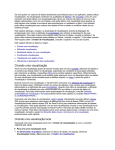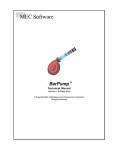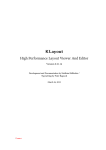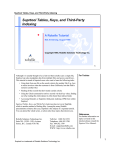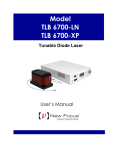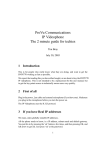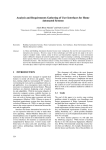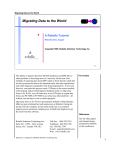Download Ensuring Data Integrity using Suprtool
Transcript
Ensuring Data Integrity using Suprtool Ensuring Data Integrity using Suprtool A Robelle Tutorial by Mike Shumko August 1997 Copyright 1997, Robelle Solutions Technology Inc. 1 Each production database needs programs to ensure that company rules and conventions are being followed. Unfortunately, these programs seldom get written. This tutorial is for those who want to learn how to perform a wide range of integrity checks with Suprtool, Robelle's highperformance data tool on the HP 3000. It will include the following integrity checks: For Techies • Do debits equal the credits? • Are there customers with two addresses? • Are all dates within the last 18 months? • Are there order headers with no line items? • Are there missing auxiliary records in KSAM or flat files? • Does price times quantity equal extended-amount in all records? • Are there at least five status reports per work-order? References Robelle Solutions Technology Inc. Suite 201, 15399 - 102A Avenue Surrey, B.C. Canada V3R 7K1 Toll-free: 1.888.ROBELLE 1.888.762.3553) Telephone: 604.582.1700 Fax: 604.582.1799 E-mail: [email protected] Web: www.robelle.com For further information on topics covered in this tutorial, please consult the Suprtool User Manual. Suprtool is a trademark of Robelle Solutions Technology Inc. Other product names and companies may be the trademarks of their respective owners. 1 Ensuring Data Integrity using Suprtool What’s Inside Page n Types of integrity checks 3 n n Simple rule verification Duplicate detail records 4 5 n Correct data values 6 n n Missing pseudo masters Masters without details 8 9 n Relationships between fields 10 n Check completeness 11 n Relationships between files 13 n Summary 20 2 This tutorial will show you how Suprtool can perform a wide range of integrity checks to ensure that data is both correct and complete. We will end the tutorial with a set of job streams that show you complete examples of each integrity check. For Techies References 2 Ensuring Data Integrity using Suprtool Types of integrity checks 1. Simple rule verification 2. Duplicate detail records 3. Correct data values 4. Missing pseudo master records 5. Master records without attached details 6. Relationships between fields 7. Check completeness 8. Relationships between files 3 You will learn how to use Suprtool to perform the following integrity checks: 1. Do debits equal credits? 2. Customers with two address records 3. Check data values by: pattern (E.g., postal codes) date range (E.g., only the last 18 months) defined subfield (E.g., second character always an "S") list of valid values (E.g., transaction types) 4. Master records kept in KSAM or flat files 5. Order headers without line items 6. Does price x quantity = amount? 7. At least five status records per work order A control record for all 50 states No group of transactions totals a negative amount 8. For Techies All sample output in this tutorial was generated using version 3.7 of Suprtool/iX running on an HP 3000 Series 927 (MPE/iX version 5.0). References Do batch totals = total of all batches? As we go through these examples, feel free to contribute your ideas and we'll see if Suprtool can handle them. 3 Ensuring Data Integrity using Suprtool Simple rule verification n Do the debits equal the credits? :run suprtool.pub.robelle >base fms.gl,5,reader >get d-transactions >output $null >total trans-amt >xeq Totals (SUN, JAN 29, 1995, 2:56 PM): TRANS-AMT 81451+ IN=6, OUT=6. CPU-Sec=1. Wall-Sec=1. 4 Financial transactions are often processed in batches. If there are programming bugs or if jobs abort, a batch may become unbalanced by losing a credit or debit transaction. You can use the Total command to quickly check whether the sum of all the transactions equals zero. For Techies Each pass can total up to 15 fields. By default, the sum calculated by the Total command is displayed on the screen ($STDLIST). You can also append the sum to the output file by using the following commands: set squeeze off total $file filename,append References For a complete sample script, see page 14. To locate an unbalanced batch with the Total option of the Duplicate command, see the example on page 19. 4 Ensuring Data Integrity using Suprtool Duplicate detail records n Are there customers with two address records? >get d-addresses >sort cust-no >duplicate only keys >list standard title "Customers with duplicate addresses" >xeq 5 Unlike master datasets, detail datasets do not ensure unique keys. Suprtool's Duplicate command provides an easy way to detect duplicate records. For Techies The Keys option in the Duplicate command refers to the fields specified in the Sort command. The sorted fields do not have to be IMAGE keys. For example, Input 1111 123 Main St. Output 2222 33359 East Ave. 2222 15458 West Ave. 2222 33359 East Ave. 3333 13 Lake Shore Dr. WARNING: If you use the Delete and the Duplicate commands in the same task, Suprtool will delete much more than just the duplicate records because the Delete operation occurs in the input phase of Suprtool processing while the Duplicate operation occurs in the output phase. If there are only a few duplicates, then you can manually delete them with Suprtool's Dbedit. For more information, see the Suprtool User Manual or call Robelle Technical Support. References For more information on all the options to Suprtool commands, consult the Suprtool User Manual. For a complete sample script, see page 14. 5 Ensuring Data Integrity using Suprtool Correct data values By pattern n >if phone-no >< "(###) ###-####" >if product >< "@WIDGET@" {phone number with area code} {we only sell WIDGETS} By date range n >item order-date,date,yyyymmdd >if order-date < $date(*/*-6/last) {orders older than 6 months} (*/*-6/last) is the last day of the month, six months ago 6 Suprtool pattern-matching uses the following operators: == selects records that match a pattern >< For Techies selects records that do not match a pattern You can use these special characters for pattern-matching: @ zero or more characters of any type # a single numeric character ? a single alphanumeric character ~ zero or more blank characters & escape character, next character is literal match E.g., &@ matches the @ character Date checking requires an Item command to define the date format. YYYYMMDD, YYMMDD, YYMM, PHDATE, ASK and CALENDAR are valid formats that support "<" and ">" comparisons in Suprtool $date and $today functions. MMDDYY, MMDDYYYY, DDMMYY, and DDMMYYYY formats can only support the "=" operator. References To test for a relative date with the $today function, see a complete sample script on page 15. How would you find dates greater than tomorrow? 6 Ensuring Data Integrity using Suprtool Correct data values continued n By subfield >define code2,product-code[2],1 >if code2 <> "S","T" {2nd character must be "S" or "T"} n By data class >if part-code <> alpha {part codes not numbers or spaces} 7 The Define command identifies temporary fields that can be used with the If, Extract, Item, Sort, Table and Duplicate commands. Temporary fields are especially useful in systems that reserve space for future fields (E.g., FILLER-80). For Techies The maximum length of a command line is 256 characters. To extend an If command, you can use an ampersand (&) at the end of the line to indicate continuation. For expressions longer than 256 characters, use the $read function or the Table command. You can use the following reserved words in an If statement to check whether all the characters in a field are one class: ALPHA A-Z, a-z (52 characters) NUMERIC 0-9 (10 characters) ALPHANUMERIC A-Z, a-z, 0-9 (62 characters) SPECIAL anything else (194 characters including space, punctuation, Roman-8 letters, binary junk) How can you find fields with null values? References For a complete sample script, see page 15. For an example of a Table command with an If expression, see the slide on the next page. 7 Ensuring Data Integrity using Suprtool Missing pseudo master records n Master records that are kept in KSAM or flat files >input >define length} >extract >output >xeq >get >table >if >list prodmast {KSAM master file} product-code,3,8 {3 byte offset, 8 byte product-code prodkeys,temp,link d-inventory master-table,product-code,file,prodkeys not $lookup(master-table,product-code) standard title "Products without Masters" 8 Sometimes systems include master files that are not IMAGE databases (E.g., to facilitate sorted key access to the masters). To check if detail records exist without masters, you can create a table file of the master keys. Then you can read the details using the Table command and the If command with the $lookup option. Any detail records without keys in the table are "orphans". For Techies The Table command ignores any duplicates before it starts sorting and processing the table file. References For a complete sample script, see page 16. 8 Ensuring Data Integrity using Suprtool Masters without details n Order headers without line items >get >extract >sort >out >xeq >get >table >if >list d-order-items order-no order-no orditems,temp,link m-order-header detail-table,order-no,sorted,orditems not $lookup(detail-table,order-no) standard title "Orders without line items" 9 To find master records without details, you can use a technique that creates a table file of the detail keys. Then you can read the master records with the Table command followed by the If command with the $lookup option. Any master records without keys in the table are "childless". For Techies If you are reading large datasets (over 100,000 records), it is usually faster to sort a table file when you are creating it than to use the File option of the Table command. Suprtool's Sort command uses our proprietary sort routines while the Table command uses an insertion sort. Remember to use the Sorted option with the Table command instead of the File option. References For a complete sample script, see page 16. 9 Ensuring Data Integrity using Suprtool Relationships between fields n Does price multiplied by quantity always equal amount? >get >if >list n d-sales price * quantity <> amount standard title "Price * Qty not = Amount" Student Exercises n n Is the sales tax always 7% of the sales amount? Is the pay amount correct? It should be the pay rate times the regular hours plus time-and-a-half for overtime hours. 10 In most systems, there are many built-in formulas that need to be checked for compliance. The If command supports arithmetic operations in the following order of precedence: ( ... ) Parentheses have the highest precedence NOT Take the opposite (logical negation) AND Both conditions must be true OR One or the other condition must be true - Unary minus */ Multiplication and division, higher than + and - +- Addition and subtraction, use parentheses where needed You cannot perform arithmetic operations on byte-type fields, and arithmetic expressions cannot start with a numeric constant (E.g., 2 + a = 10 is invalid). If you do have a byte-type field consisting entirely of numeric digits, you can redefine the field to a display-type and use the new field name in an If command. For Techies References For a complete sample script, see page 17. 10 Ensuring Data Integrity using Suprtool Check completeness n At least five status records per work order >get >extract >sort >duplicate >output >xeq >input >if >list d-process work-order work-order none keys count total status-code worksum,link,temp worksum st-count <> 5 or st-total-1 <> 150 standard title "Non-Standard work-orders" 11 Lets say that each work order goes through 5 stages and that each stage generates a detail record with a status-code of 10, 20, 30, 40 and 50 respectively. For Techies You can use the Duplicate command to summarize, count and subtotal the status-codes for each work order. In this scenario, a standard work order will count up to five and subtotal the status-codes to 150 (10 + 20 + 30 + 40 + 50). The Total option of the Duplicate command generates a new variable for each field selected, and names the variables ST-TOTAL-1, ST-TOTAL2 etc. One field counts the five stages and its variable name is STCOUNT. The Define command can later rename these fields so they are more meaningful. >define work-orders, st-count References >define status-checksum, st-total-1 For a complete sample script, see page 18. >if work-orders <> 5 or status-checksum <> 150 11 Ensuring Data Integrity using Suprtool Check completeness using HowMessy n Only 5 records per work order >input >if n loadfile dataset = "D-PROCESS" and & searchfield = "WORK-ORDER" and & (maxchain <> 5 or avechain <> 5.00) Only one address per customer >input loadfile >if dataset = "D-ADDRESSES" and & maxchain > 1 12 Your Suprtool tape also includes the bonus program HowMessy which generates statistics for a database. When it produces the report, it also creates a temporary self-describing file called Loadfile. You can write detailed job stream that examine the HowMessy output. Here are some of the fields from that file: DATABASE DATASET DATASETTYPE CAPACITY ENTRIES LOADFACTOR SECONDARIES HIGHWATER SEARCHFIELD MAXCHAIN AVECHAIN STDDEVIATION For Techies References 12 Ensuring Data Integrity using Suprtool Relationships between files n Batch control total must equal the sum of batch records 1. Create a link file of the batch control records with batch-amt 2. Create a link file of the summarized transaction records 3. Use Suprlink to merge the two files >input mergfile >define actual-total,st-total-1 >if batch-amt <> actual-total >list standard title "Batches with incorrect totals" 13 Some systems batch their transaction entries and keep a control record in a master file. To check whether the sum of the detail records equals the control amount, you can create two self-describing files. One file contains the control totals from the control records and the other file reads the detail records and uses the Total option of the Duplicate command to create a summary record for each batch. You can use Suprlink to merge the two files and then compare the two fields with the If command. For Techies References For a complete sample script, see page 19. 13 Full sample job stream for correct data values !job dbcheck,mgr.sales,db ! !comment Integrity Check: 3. Correct Data Values !comment This job runs Suprtool to print these exception reports: !comment Phone numbers not in the form (604) 582-1700 !comment Product names that do not include the word "WIDGET" !comment Order dates older than 6 months or beyond tomorrow !comment Product codes whose 2nd character is not "S" or "T" !comment Part codes that are not ALL letters ! !file suprlist;dev = lp !run suprtool.pub.robelle base sales.db,5,reader get m-customer if phone-no >< "(###) ###-####" list standard title "Irregular Phone numbers" xeq get if list xeq m-product description >< "@WIDGET@" standard title "Non-WIDGET Product names" get item if list xeq d-order order-date,date,yyyymmdd order-date < $date(*/*-6/last) standard title "Orders older than 6 months ago" get if list xeq d-order order-date > $today(+1) standard title "Orders made after tomorrow" get define if list xeq m-product code2,product-code[2],1 code2 <> "S","T" standard title "Products whose 2nd char. is not S or T" get if list exit m-inventory part-code <> alpha standard title "Parts that are not ALL letters" 15 Full sample job stream for missing pseudo masters and details !job dbcheck,mgr.sales,db ! !comment Integrity Check: 4. Missing Pseudo Master Records ! !comment This job runs Suprtool to list all the products in !comment the inventory detail set that are missing from the !comment KSAM prodmast file. !comment It also lists all order header records that have no !comment detail line items. ! !file suprlist;dev = lp !run suprtool.pub.robelle input prodmast {KSAM master file} define product-code, 3, 8 extract product-code output prodkeys, temp, link xeq base get table if list xeq ! !comment ! get extract sort out xeq get table if list exit ! !eoj sales,5,reader d-inventory master-table,product-code,file,prodkeys not $lookup(master-table,product-code) standard title "Products without Masters" Integrity Check: 5. Masters Without Details d-order-items order-no order-no orditems, temp, link m-order-header detail-table, order-no, sorted, orditems not $lookup(detail-table, order-no) standard title "Orders without line items" 16 Full sample job stream for relationships between fields !job dbcheck,mgr.sales,db ! !comment Integrity Check: 6. Relationships Between Fields ! !comment This job runs Suprtool to list the following !comment situations: !comment sales price * quantity not equal to amount !comment sales tax not equal to 7% !comment sales commissions greater than 15% !comment payroll payments with computation errors !comment ! !file suprlist;dev = lp !run suprtool.pub.robelle base sales,5,reader get d-sales if price * quantity <> amount list standard title "Price * Qty not = Amount" xeq get if list xeq d-sales (amount * 0.07) <> sales-tax standard title "Sales tax not = 7% of sales amount" get if list xeq d-commissions (commission-owed / sales-amt) > 0.15 standard title "Commissions greater than 15%" base get if payrol,5,reader d-payments (reg-hrs * pay-rate) + (ot-hrs * pay-rate * 1.5) & <> pay-amount standard title "Paycheck computation errors" list exit ! !eoj 17 Full sample job stream for completeness test !job dbcheck,mgr.sales,db ! !comment Integrity Check: 7. Completeness ! !comment This job runs Suprtool to verify that the Control !comment Dataset has sales tax records for the 50 valid !comment states and that all 50 state codes are present. ! !comment M-CONTROL is the dataset of control table records, !comment the key control-key, 2 bytes = table type and !comment 2 bytes = table value. !comment Table 15 is for State Sales Tax records. E.g.,"15CA" !comment The file STATES is a 50 line file with valid state !comment codes. ! !file suprlist;dev = lp !run suprtool.pub.robelle base gl,5,reader get m-control define type, control-key, 2 define value, control-key[3], 2 table state-table, value, file, states if type = "15" and not $lookup(state-table, value) list standard title "Invalid State Sales tax records" xeq get m-control if type = "15" extract value output mcontrol, temp xeq input states define value, 1, 2 table tax-table, value, file, mcontrol if not $lookup(tax-table, value) list standard & title "States missing from the Sales & Tax table" exit ! !eoj 18 Full sample job stream for relationship test !job dbcheck,mgr.sales,db ! !comment Integrity Check: 8. Relationships Between Files ! !file suprlist;dev = lp !run suprtool.pub.robelle base gl,5,reader get m-batch sort batch-no extract batch-no, batch-amt output mbatch, temp, link xeq get sort duplicate extract output xeq d-transactions batch-no none keys total trans-amt batch-no dtrans, temp, link link link link link input dtrans link mbatch output mergfile, temp exit input define if list mergfile actual-total, st-total-1 batch-amt <> actual-total standard title "Batches with incorrect totals" exit ! !eoj 19 Full sample job stream for invalid dates !job dbcheck,mgr.sales,db ! !run suprtool.pub.robelle base sales,5,reader get item if extract sort duplicate list xeq d-sales order-date,date,ccyymmdd $invalid(order-date) order-date order-date none keys count standard title “Invalid date values, counted” exit !eoj Sample-21 Full sample job stream for comparing records in two files !job dbcheck,mgr.sales,db ! !run suprtool.pub.robelle base sales,5,reader get d-sales define address-1,address extract order-no, address-1 sort order-no output file1 link xeq base get define extract sort output xeq archive,5,reader old-sales address-2,address order-no, address-2 order-no file2 link link link link link input link output xeq input if list xeq file3 address-1 <> address-2 standard title “Addresses don’t match between files” file1 file2 file3 exit !eoj Sample-22 Ensuring Data Integrity using Suprtool Invalid dates n Dates that don’t make sense >item >if order-date,date,ccyymmdd $invalid(order-date) 15 To find date values that are syntactically incorrect, use the $invalid function of the If command. $invalid looks for dates whose values don’t fit the rules for the date type defined in the Item command. For example, a month of 0, a day of 99, or a day of 31 for month 11. Of course, $invalid takes leap years into account. For Techies $invalid was introduced in Suprtool version 4.0, in 1997. To find only the valid dates, use IF NOT $INVALID(field-name). You may not think you have any invalid dates (your application program does a good job of validation), but do you have any flag values that have special meaning? E.g., 999999, -1, 0, NEVER, NOTADATE, ******. The sample jobstream shows you all invalid dates and flag values, and how often they appear in the file. References For a complete sample script, see page ‘Sample-21’. 15 Ensuring Data Integrity using Suprtool Comparing records in two files n Records in two files should have the same values in the address field >link >link >link >link input link output xeq file1 file2 file3 >input >if >list file3 address-1 <> address-2 standard title “Addresses don’t match” 16 If you have two files that are supposed to mirror each other, you can use Suprtool to look for discrepancies. For Techies You need to be able to match the records based on some common field. Then in the matching records you can look for differences. Create a composite file using Suprlink that has all the fields you are interested in, from both files. References For a complete sample script, see page ‘Sample-22’. 16 Ensuring Data Integrity using Suprtool Summary of Suprtool Integrity Checks n Easy to validate many important facts and relationships n No need to write programs n Fast execution n Sample job streams can be modified 17 One way to make the jobs more intelligent is to initialize a variable to zero. Then after each Suprtool task, increment it by the value of the variable SuprtoolOutCount. If at the end of the job, the value of the new variable is still zero then the job's $Stdlist can be deleted. !job dbcheck,mgr.sales,db;outclass=,5 ! !setvar errorcount, 0 ! !run suprtool.pub.robelle ... { task # 1 } setvar errorcount, errorcount + suprtooloutcount ... { task # 2 } setvar errorcount, errorcount + suprtooloutcount exit ! !if errorcount = 0 then ! set stdlist=delete !endif !eoj For Techies Suprtool automatically generates the variable SuprtoolOutCount with the number of records selected. References 17























